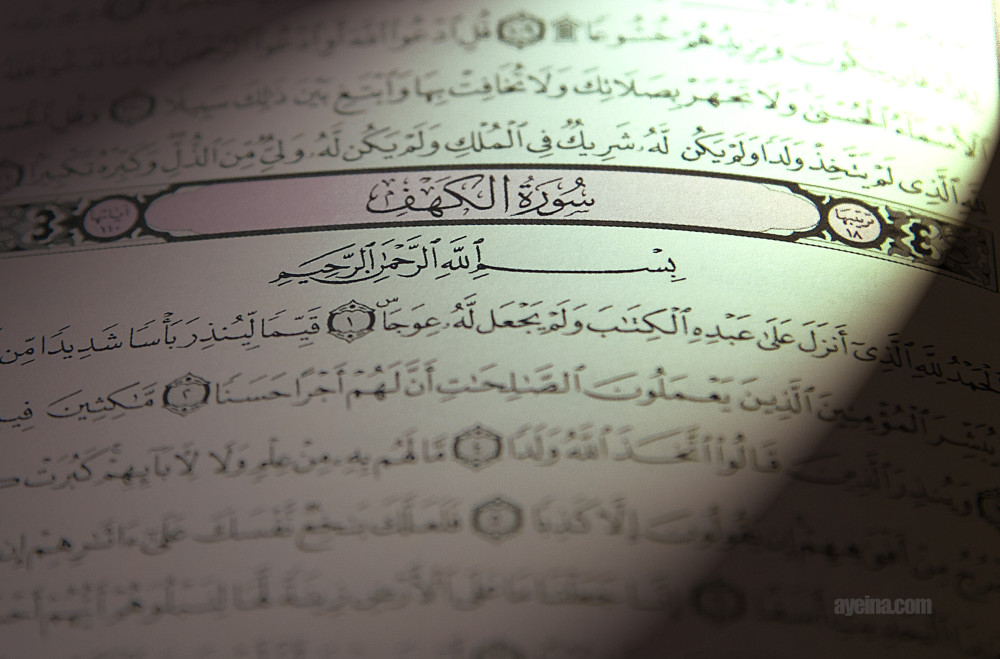Surah Kahf
2. Trial of Wealth – Story of a man with 2 gardens (verse: 32 – 44)
3. Trial of Knowledge – Story of Musa (AS) and Khidr (verse: 60–82)
4. Trial of Power – Story of Dhul-Qurnain with Yajuj Majuj (Gog magog) (verse: 83–98)
(a) From Abu Sa’eed al-Khudri, who said: “Whoever reads Soorat al-Kahf on the night of Jumu’ah, will have a light that will stretch between him and the Ancient House (the Ka’bah).”
(Narrated by al-Daarimi, 3407. This hadeeth was classed as saheeh by Shaykh al-Albaani in Saheeh al-Jaami, 6471)
(b) “Whoever reads Soorat al-Kahf on the day of Jumu’ah, will have a light that will shine from him from one Friday to the next.”
(Narrated by al-Haakim, 2/399; al-Bayhaqi, 3/249. Ibn Hajar said in Takhreej al-Adhkaar that this is a hasan hadeeth, and he said, this is the strongest report that has been narrated concerning reading Soorat al-Kahf. See: Fayd al-Qadeer, 6/198. It was classed as saheeh by Shaykh al-Albaani in Saheeh al-Jaami’, 6470)
(c) It was narrated that Ibn ‘Umar (may Allaah be pleased with him) said: “The Messenger of Allaah (peace and blessings of Allaah be upon him) said: ‘Whoever reads Soorat al-Kahf on the day of Jumu’ah, a light will shine for him from beneath his feet to the clouds of the sky, which will shine for him on the Day of Resurrection, and he will be forgiven (his sins) between the two Fridays.’”
Al-Mundhiri said, this was narrated by Abu Bakr ibn Mardawayh in his Tafseer, with an isnaad with which there was nothing wrong.
(al-Targheeb wa’l-Tarheeb, 1/298)
The soorah may be read during the night or the day of Jumu’ah. The night of Jumu’ah starts from sunset on Thursday, and the day of Jumu’ah ends at sunset. Therefore the time for reading this soorah extends from sunset on Thursday to sunset on Friday.
Al-Mannaawi said:
Al-Haafiz ibn Hajar said in his Amaali: “In some reports it says ‘the day of Jumu’ah’ and in some reports it says ‘the night of Jumu’ah’. They may be reconciled by saying that what is meant is the day which includes the night and vice versa.” (Fayd al-Qadeer, 6/199)
Al-Mannaawi also said:
“It is recommended to read it during the day or night of Jumu’ah, as al-Shaafa’i (may Allaah have mercy on him) stated.” (Fayd al-Qadeer, 6/198)
There are no saheeh ahaadeeth concerning reading Soorat Aal ‘Imraan on Friday. All the reports that have been narrated concerning that are either da’eef jiddan (very weak) or mawdoo’ (fabricated).
It was narrated that Ibn ‘Abbaas said: “The Prophet (peace and blessings of Allaah be upon him) said: ‘Whoever recites the soorah in which the family of ‘Imraan (Aal ‘Imraan) are mentioned on Fridays, Allaah and His angels will send blessings upon him until the sun sets.’”
(Narrated by al-Tabaraani in al-Mu’jam al-Awsat, 6/191; and al-Kabeer, 11/48. This hadeeth is da’eef jiddan (very weak) or mawdoo’ (fabricated)).
Al-Haythami said, “This was narrated by al-Tabaraani in al-Awsat or al-Kabeer, and it includes Talhah ibn Zayd al-Riqqi, who is da’eef (jiddan) ((very) weak).” (Majma’ al-Zawaa’id, 2/168).
Ibn Hajar said: Talhah is very weak, and Ahmad and Abu Dawood accused him of fabricating reports. (See Fayd al-Qadeer, 6/199)
Shaykh al-Albaani said: (it is) mawdoo’ (fabricated). See hadeeth no. 5759 in Da’eef al-Jaami’.
And al-Taymi narrated in al-Targheeb that “Whoever recites Soorat al-Baqarah and Soorat Aal ‘Imraan on the night of Jumu’ah will have reward like that which is between the seventh earth and the seventh heaven.”
Al-Mannaawi said, it is ghareeb da’eef jiddan (strange and very weak).(Fayd al-Qadeer, 6/199)
Because of the tribulation of the Anti-Christ it is important to memorize the first and last ten Ayaat of this Surah.
Let’s learn Surah Kahaf’s first 10 verses (last 10verses as well, according to one narration but since first ten verses are mentioned more often so we will take baby steps for now and in shaa Allah after that we can strive to memorize the last ten verses as well).
Why?
1) Because Prophet (saws) asked us to
He only asked us to do what he did himself. So consider it as a sunnah as well (not just the way of prophet (saw) but of so many companions, successors and so on).
I have never come across memorization of any specific surah/ayaat except for this.
“If anyone learns by heart the first ten verses of the Surah al-Kahf, he will be protected from the Dajjal.” [Muslim]
Though memorization of some surahs is just plain obvious (like Surah Fatiha for the validation of your prayer), but Surah Kahaf’s memorization has been specifically talked about.
Since Prophet (saws) was so concerned about us (as mentioned in the sixth verse), following his advice is the least we can do…
2) Because memorization is important
Most of us think of memorization as an extra deed, but the following hadith clarifies how hollow your soul is when you have nothing of the Quran in your heart.
He who does not memorize any part from the Qur’an he is like the ruined house. [At-Tirmidhi]
You might ask, why memorize in the 21st century when we have the Quran preserved by Allah and there are millions of copies and apps for it right at our fingertips, machine memory practically supplanting brain memory?
Because to take a verse to heart is to know it by heart. Memorization provides us with knowledge of a qualitatively and physiologically different variety— you take the verse inside you and you know it at a deeper level than if you had simply read it off a screen. What you have in your heart is more easy to access and apply to your life in spontaneous situations. You won’t have to open the copy of it or turn on your mobile for that.
Quranholds so much wisdom in it that keeping it in your heart will make you a wise person as well.
3) Because you will be raised in ranks if you memorize
The more you memorize, the higher the rank.
Recite and rise up, and be increased in reward with every Ayah. [Tirmidhi]
Memorization doesn’t only mean to save it in your heart but also to absorb it deep within. So much so that Quran could be seen on you. People could tell, just by looking at you, that you have memorized the Quran or a part of it.
The character of Prophet (saws) was the Quran, as narrated by Aishah (ra).
4) Because memorizing is a source of peace and tranquility
In a world full of turmoil, we could all use a moment of serenity.
“A man was reciting Surat Al-Kahf and his horse was tied with two ropes beside him. A cloud came down and spread over that man, and it kept on coming closer and closer to him till his horse started jumping (as if afraid of something). When it was morning, the man came to the Prophet, and told him of that experience. The Prophet (saws) said, “That was As-Sakina (tranquility) which descended because of (the recitation of) the Qur’an.”” [Bukhari]
5) Because memorizing teaches you the fundamentals of Islam
Allah combines three fundamentals of Islam in first ten verses – Oneness of Allah (as mentioned in verses four and five), revelation upon Prophet (saws) (as mentioned in the first verse) and recompense [(as mentioned in verses two and three) – hence combining two emotions together; fear (to not let us procrastinate) and hope (to let us always strive for better).]
6) Because memorizing increases your eemaan (faith)
Surah Kahaf has many stories in it that teach you so many practical lessons to implement in your daily life. But the first ten verses help you to develop a strong connection with Quran because there is no possibility of deviation in it (as mentioned in the first and second verse).
How do we know that Islam is the ultimate truth? It’s the Quran.
No matter how languages evolve, cultures change or standards twist, this one book will never change. No matter how many winds swirl, the whole forest may fall to the ground but this tree shall stand still, embed in it’s ground. There’s a war being raged against it. War of values before the war of Dajjal is upon us.
We have something we can hold onto because it will stay the same till the end of time. So if you want strength, you come to this book. You want to just fear Allah and not Dajjal or anyone? This book has an answer. It will increase your eemaan (faith) in shaa Allah.
7) It gives you a goal to achieve in this world.
This worldly life is a test for all of us (as mentioned in the seventh verse) as to how many among us struggle towards the best of deeds. Not the most but rather the best. Allah is not looking for quantity but quality.
Contrary to our belief that hardships are a test from Allah, here Allah tells us that the adornment of this earth (wealth, beauty, spouses, children, fame etc) is also a test for you. Whoever uses these blessings in the best of ways, receives the glad tidings.
The best of rewards are for the best of deeds.
8) It’s a shield against Dajjal (Antichrist).
Prophet (saws) warned us ahead of time that – Between time of the creation of Adam and the Resurrection Day, there is nothing greater than the trial of Dajjal (the Antichrist). [Muslim]
When I see the situation in Gaza nowadays, I usually think it can’t get any worse. But it will.
That’s why Prophet (saws) used to seek Allah’s refuge from Dajjal in his prayer.
When any one of you utters tashahhud (in prayer) he must seek refuge with Allah from four (trials) and should thus say: “O Allah! I seek refuge with Thee from the torment of the Hell, from the torment of the grave, from the trial of life and death and from the evil of the trial of Masih al-Dajjal (Antichrist).” [Muslim]
He will be a combination of every tribulation, man has ever known. Trial of wealth (what owner of the two gardens suffered), power (taught through Dhul-Qarnayn’s story), knowledge (as learned in Musa (as) and Khidr (as)’s story) and faith (what people of the cave went through).
Prophet (saws) said: . . . Those of you who live up to his time should recite over him the opening verses of Surat al-Kahf, for they are your protection from his trial . . . [Abu Dawood]
9) To be companions of Eesa (as)
Imagine Eesa (as) repeating what he said once to his hawaariyyoon (disciples) – Who are my supporters? my companions for the sake of Allah? and you answering – we are supporters for Allah!
But for that, you need to survive the fitna (trial) of Dajjal and to protect yourself, you need to first memorize Surah Kahaf’s verses and then live them as well.
But you may say that you won’t be living until that time.
First of all, who knows? Time is in Allah’s hands. He may stretch it or shrink it and the hour may be upon us while we are unaware of it.
Secondly, if it doesn’t happen in your time, your later generations will be faced with that trial nonetheless. So to teach them these verses, you need to know them first yourself. Don’t you wish that the believers whose faces will be wiped by Eesa (as) (who will tell them their status in Paradise), are among your generations? Something that will raise your ranks in Jannah as well in shaa Allah. Think ahead as Ibrahim (as) did. Allah indeed accepts the duas but for that we need to put some effort too.
Back in our ancestry, may be there were companions of the Prophet (saws) or may be prophets themselves (after all we all are from Adam (as)/ Nuh (as) who was aadam-e-thaani) and may Allah make our generations, down the line, as one of the hawaariyyoon.
10) There is a beautiful dua at the end.
The tenth verse is a wonderful dua which those young people of the cave (who Allah presented as role models for the youth) made.
So every time you recite these verses, you make this dua also, asking for Allah’s special mercy (since the word min ladunka is used, which is superior to words min doonika or min indika— all meaning the same in english but in arabic, each of them has a specific meaning).
Grant us mercy, very close and near to You, our Rabb, that comes especially from Your secret vaults. Guidance, forgiveness and provision.
10 Practical Tips
1) Listen to these verses on repeat, till they roll on your tongue automatically. Listen to them while traveling, driving, cooking, cleaning etc.
2) Once you are done with the listening part for few days or hours (depending on every individual), keep the Quran in front of you to see the text while you listen to the verses. Listening also helps keep your tajweed right.
3) Don’t forget memorizing the translation with it for better understanding.
4) Train your brain with impression. Be impressed with the text. Stop and picture a scene in your mind to make the impression stronger.
5) Associate – Link the text to something you already know.
6) Repeat with your tongue (aloud) – The more you repeat, the more you remember.
7) Don’t say to yourself that you can not memorize because of your bad memory. Because to improve a bad memory, you need to memorize anyway. Believe in yourself that you can! Battle the bad with the good.
8) Once you have memorized them, recite them in your prayer. Break them down to five verses each rak’ah for ease. Practice makes a person perfect.
9) Make someone take your oral test.
10) Last but not least, don’t worry because Allah will save it in your heart inshaaAllah. Just trust Allah and do it.
“And We have certainly made the Quran easy for remembrance, so is there any who will remember?” [Quran, 54:17]
May Allah help you all with the memorization of it. I would love to know which one of you memorized it, in the comments below.






jazakallah khair for sharing sister, I am going to memorize these verses in sha Allah.
Insha Allah I will come back to give testimony of my memorization of the 10 verses.
very well researched article May Allah bless you
Reciting Surah Al-Kahf regularly is a source of spiritual light, protection, and wisdom for every Muslim. May Allah guide us all. Ameen